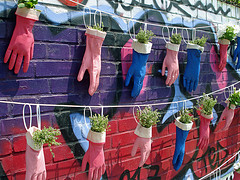Urban gardening and agriculture in public spaces are becoming accepted as potent means for personal transformation, small-scale economic activity, and for larger-scale climate mitigation and adaptation. This week, Dallas Interfaith Power & Light will be touring the East Dallas Promise of Peace community garden at White Rock United Methodist Church — built, of all places, on top of an unused parking lot! Based on the early feedback, we expect this will be the first of many opportunities to tour community gardens in the ambit of sacred spaces. Likewise, this will be the first of several blog posts on the subject.
What is urban agriculture?

source: Some Rights Reserved,
by Flickr user Diamond Geezer.
From somewhere along the
Lea River, near London, U.K.
“Urban agriculture” is simply the act of bringing agriculture — the active development of food resources — into the city. It is highly scalable, and can take the shape of school yard plots, community gardens in vacant lots, small scale farms on reclaimed land, greenhouses on strong building roofs, or at its simplest, a patio of herbs and vegetables. Naturally, Wikipedia can tell you all about it. Another great resource for learning about this subject is the Resource Centres on Urban Agriculture and Food Security, an internationally-funded organization that works on issues of government policy and civic society capacity-building.
Where are they found?
In addition to Promise of Peace, there are many community gardens throughout the DFW area, including at numerous churches and temples. The Gardeners in Community Development Group tries to maintain a comprehensive list of such gardens.
Some of the many inspiring examples of urban agriculture elsewhere in North America include:
- Beacon Food Forest, currently under development in Seattle. "A Food Forest is a gardening technique or land management system that mimics a woodland ecosystem but substitutes in edible trees, shrubs, perennials and annuals."
- Lufa Farms, the rooftop greenhouse in Montreal. Read about David Suzuki's tour.
- Growing Home, a network of farms in the city of Chicago. "Growing Home changes lives and communities with organic agriculture - through job training, social enterprise, and community development."
- For backyard-farmer companies, business is bountiful. Interested in fresh food from your backyard, but don't have the time or skill to work the land yourself? Innovative companies are popping up that will send their farmers to manage the land for you.
- Promoting Urban Agriculture in Mexico City - Sembradores Urbanos is another example of concrete gardening.
Follow-up
I plan to follow-up this short article with additional posts addressing these questions:
- What does it have to do with climate change?
- Why mix gardening/agriculture and religion?
- What resources are available to help individuals and groups get started?
Posted with : Social Discourse, Nature, Sustainability, Environment, Wildlife